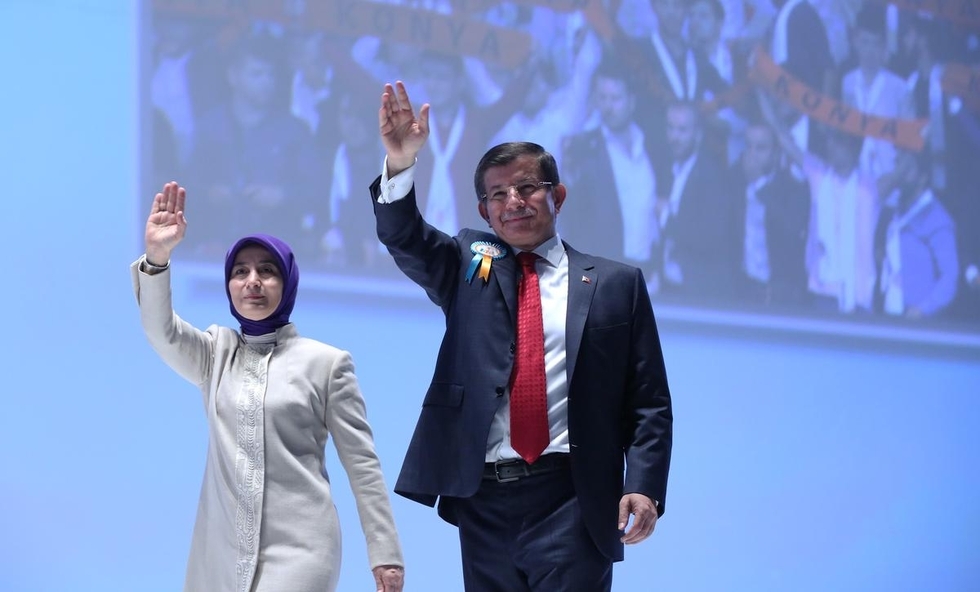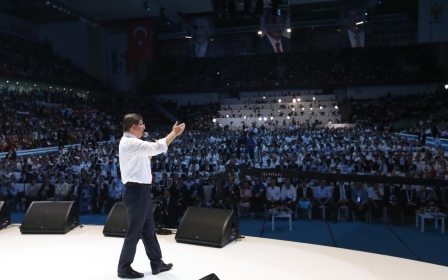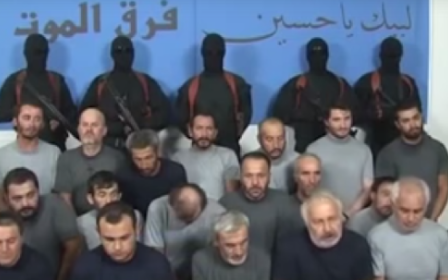Turkey’s AK Party needs to adopt a new narrative

Turkey's governing Justice and Development Party (AK Party) held its fifth congress on 12 September. Prime Minister Ahmet Davutoglu ran as a single candidate and received all of the votes cast by the delegates.
In comparison to the previous congress, this congress can be regarded as a low-key one, generating less excitement and almost no major political narrative. Due to the increasing military death tolls in the fight with the Kurdistan Worker's Party (PKK), the party did not play music as a mark of respect to the fallen soldiers and policemen.
The only point picked up by the media was that the makeup of the party's new central executive committee bore almost exclusively the stamp of President Recep Tayyip Erdogan. Hence it was seen as a testament to the level of power wielded by Erdogan within the party.
These analyses are accurate but incomplete. The AK Party has never solely been a political party. It was a wider movement that also encompassed a political party. Erdogan and the AK Party were both products of this movement, but also incubators that grew the party and movement to an unprecedented level.
When Erdogan was the leader of the party, people did not see much of a difference between the party and the movement because Erdogan served as a leader for both. But since he left the party chairmanship and the role of prime minister to become president, this difference has increasingly come to the fore. People have increasingly seen that the leader of the movement and the party have decoupled.
Leading a social movement
At the outset, what led people to be perplexed by Erdogan’s new role was that the post of the prime minister (combined with the chairmanship of the AK Party) is constitutionally the strongest in the political system in Turkey. But from a sociological and political standpoint, President Erdogan has remained the most popular and powerful figure. The AK Party’s social base still regards Erdogan as the leader of the movement, as do a large chunk of the party’s cadres. The developments since Erdogan moved to the presidential office on 28 August, 2014 have illustrated that sociological-political power counts more than the legal one in politics.
In the internal power hierarchy of the conservative/Islamist Movement, a component of which is the AK Party, Erdogan still sits atop. In the end, a movement is more of a sociological and political phenomenon, whereas a political party is more of a legal one.
Nevertheless, managing this dichotomy is no easy job. Dual leadership means dual styles, narratives, priorities and cadres.
And this comes at a time when the need to institutionalise the party mechanism is acute. The AK Party was created by a young reformist cadre disillusioned by the old-style politics of the late pro-Islamic National Outlook Movement and its charismatic leader Necmettin Erbakan. In the first two periods of its rule, the nature of the AK Party as a cadre movement, valuing the collective will and intelligence of party officials, was visible and dominant.
Erdogan centre stage
Yet, in recent years, as Turkey's politics have experienced an unprecedented level of polarisation and become more conflictual, Erdogan's brand name has taken priority over that of the AK Party. The more the opposition has focused on the figure of Erdogan, as opposed to that of the AK Party, the more political power has consolidated around him.
When managing short-term crises, such unified and consolidated power around the leadership might prove effective. Yet the same process also weakens the party structure and mechanism. It dilutes the processes of collective decision-making. This undoubtedly bodes ill for the party going forward.
The party acutely needs to institutionalise itself so that it can survive the passage of its charismatic leadership, so that it does not limit its life-span to that of its leader. Unfortunately, the picture that emerged from yesterday's congress does not point to the further institutionalisation of the party. Rather it points to a divided authority between legal and socio-political power.
Another important dimension that seemed to be missing from the AK Party’s congress was a lack of sufficient emphasis on further reform towards different identity groups. This coincides with the growing trend of different identity groups parting ways with the party.
Since 2010-2011, there have been three primary groups that parted ways with the AK Party: liberals, Gulenists (a religious group), and the Kurds. One thing that needs to be underscored is that not all the groups that left the AK Party did this because of the party's loss of appetite for further reform and democratisation.
For instance, the Gulenists engaged in a power struggle with the civilian government to maintain its shady structure within the state apparatus and wield undue and undemocratic power through it. Hence their split from the party was not motivated by a noble cause.
Putting this aside, the AK Party's loss of votes is not occurring on similar levels all across the country. Instead, it is unevenly distributed and takes place as certain groups leave the party in droves.
A normal centre-right party
The qualitative impact of this is greater than its quantitative impact. The party is increasingly turning into a mere centre-right/conservative party. Such homogenisation of the social constituency will reduce the drive for further democratisation and reform. This is because one of the major factors behind the AK Party's previous democratisation agenda was the existence of diverse social and political groups within the AK Party fold and their creative interaction within the party.
In this respect, instead of going down the nationalist path, the AK Party should strive to win back some of the social groups that it has alienated in one way or another. This is not just about the party's political performance, but its political identity. Stripped of the diversity of its social base, the AK Party faces the danger of becoming yet another nationalist and statist party, hence losing its unique place in Turkey's political history.
In this regard, the AK Party's approach towards its erstwhile Kurdish constituency is important, particularly as the peace process is in tatters. It should make sure that employing security measures in the fight against the PKK does not translate itself into securitising the Kurdish issue. If this becomes the case, it will be undoing one of its great achievements.
AKP and the rise of HDP
Though the current headlines might suggest that the opposite is true, no other party has done as much for the Kurds as the AK Party. Without the AK Party-initiated peace process, and the normalisation of the Kurds and the Kurdish issue, the last election's success story, the pro-Kurdish HDP, would not have come into being.
The HDP was a party that aimed to capture Turkey's post-Kurdish issue moment, at least the armed phase of it. On this issue, probably, the history books will judge Erdogan more favourably than the current newspaper headlines suggest.
AK Party is a unique experience in Turkey’s political history that is very much still in the making. What this weekend’s congress failed to show, and what the AK Party acutely needs to do, is to update itself, adopt a new narrative, and continue on its previous reformist path while holding onto the diversity of its social constituency.
- Galip Dalay works as a research director at al-Sharq Forum and senior associate fellow on Turkey and Kurdish Affairs at Al Jazeera Centre for Studies.
The views expressed in this article belong to the author and do not necessarily reflect the editorial policy of Middle East Eye.
Photo: Turkish Prime Minister Ahmet Davutoglu and his wife Sare Davutoglu greet deputies and attendees at the 5th Ordinary Congress in capital Ankara, Turkey on September 12, 2015. (AA)
New MEE newsletter: Jerusalem Dispatch
Sign up to get the latest insights and analysis on Israel-Palestine, alongside Turkey Unpacked and other MEE newsletters
Middle East Eye delivers independent and unrivalled coverage and analysis of the Middle East, North Africa and beyond. To learn more about republishing this content and the associated fees, please fill out this form. More about MEE can be found here.





